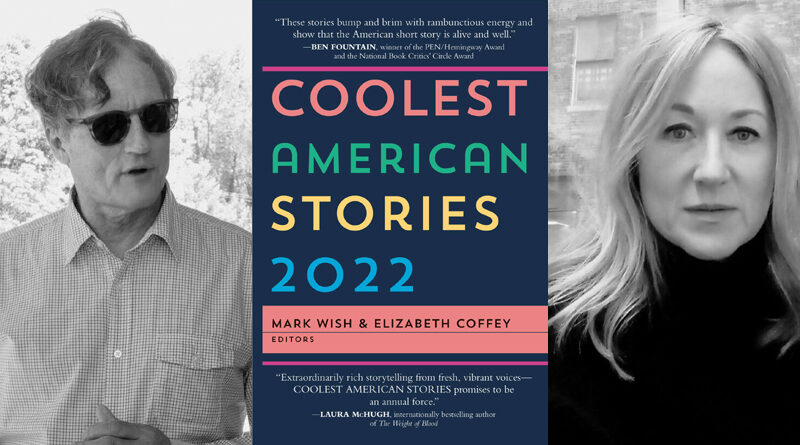Books: Coolest American Stories 2022
In order to presume that you can successfully publish a volume of coolest American stories you have to acquire the capacity to administer the quality of literary chutzpah that would be necessary to, say, for example, take on John Updike in the opening introduction — like Mark Wish does, “with all due respect, and with gratitude for all he (Updike) did to help distinguish myself (Wish) in NYC publishing.”
Mark Wish is well acquainted with the short story discipline as a writer and editor — and successful Pushcart Prize nominator. With his wife, “E,” (Elizabeth Coffey) also an editor, they are publishing, Coolest American Stories 2022, an inaugural anthology from thirteen fearless writers. These writers dare to write interesting stories. Compelling stories that could offend. They create characters with issues that could rain the heavy slag of social media down so hard it could drown and/or float literary careers. Stories told “old-school style” with suspense and conflict—without regard for or pandering to “the latest theory PhDs in literature are bickering about.”
But are they coolest?
The anthology opens with “Shepherd’s Hell,” a sober commentary and interesting story that packs a wallop, from fellow Charlotte, NC resident, Lori D. Johnson. Shepherd is an accountant, the rock of his misfit family; he manages to stay remarkably composed in the idiosyncratic dysfunction whorling around him. One night Shepherd’s eyes are opened and he sees demonic characteristics in his mother and siblings — but he hasn’t seen anything yet. Things heat up and get exponentially more diabolical when he descends into the dark basement of his family home where his younger brother delivers a shocker to Shepherd (and the reader) that ultimately helps expose the real Devil in the family. WOW!
Frances Park’s “The Summer My Sister Was Cleopatra Moon” has the feel of Amy Bloom’s haunting “Silver Water” — with one, older, exceptional but psychologically disturbing sister, and the younger, rational sympathetic narrator — but “Cleopatra Moon” takes a surprising turn. Members of an immigrant Korean family represent the complex Asian experience in America well, or as Park refers to it, the story set in 1976, the “Oriental” experience. Each family character conveys ethnic realities, fantasies and stereotypes that prevail even in 2022: the enigmatic exoticism of the Asian woman, the submissive quiet wife who seals her silence by not communicating in English, the educated underemployed overqualified professional father, and the savvy intelligent young Asian of a new generation, carrying the promise of a more integrated social breakthrough. But circumstantial forces, like fame, or in the case of Cleo, extraordinary personal charisma, that often appear to elevate humanity are rarely as elevated as they seem and Cleo let’s her sister have it one night in an excruciatingly honest scene that juxtaposes the edgy glamour of the story with her reality of the Asian American experience. This story is fearless.
In D.Z. Stone’s “Spies,” Anna, a neglected wife has had it up to here with her ambivalent husband and decides she’s going out, dressed up in “clothes he should have noticed, but he didn’t even look up.” Sitting on a stool at a local bar, where the bartender appears to be rather familiar with Anna, she scores a mysterious “Mr. Excellent Suit.” The banter is fast and clever between the two, like memorable dialogue from a hip 1940s film that the generation of your grandmother, or great-grandmother, could recite on a dime. There’s even a reference to “The Postman Always Rings Twice” — the version with John Garfield and Lana Turner. Over a couple of months Anna and Mr. Suit email and have snappy chats on the phone until they finally meet again at a fine crosstown hotel. The repartee and raillery alone would qualify this story as cool, but like all the coolest stories, “Spies” also finishes the reader off with a happy twist.
David Ebenbach uses the news of a notable writer’s death to dangle suspense over the reunion of two brothers in “All of This is Water.” The unsettling visit to the Finnish Embassy with the “little brother” and his new boyfriend is brilliant. The story’s ending is not particularly surprising but Ebenbach’s slow, subtle narrative still creates a punch to the gut at the end. A week later, the reader is still thinking about these brothers. That’s a cool story.
These stories fling themselves toward the unknown and uncertain—in that, they’re fearless. But are they coolest? For those who love short stories, Coolest American Stories 2022 is really really cool.
Preorder Coolest American Stories 2022 at Amazon
Wayne Coster Cooper is a writer and editor. He lives in Charlotte, NC. waynecostercooper.com

